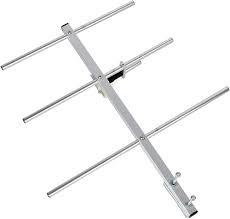Introduction: Antennas are an essential component of any television or radio system, as they allow the signals to be transmitted and received. However, not all antennas are created equal, and they can differ in their frequencies, which can affect the quality of the signals. The two most common types of frequencies used in broadcasting are UHF and VHF. In this article, we will discuss how to determine whether your antenna is UHF or VHF.
Understanding UHF and VHF Frequencies:
Before we dive into the specifics of how to determine the type of antenna you have, it's important to understand the differences between UHF and VHF frequencies. UHF stands for "Ultra High Frequency," and its frequency range is between 300 MHz and 3 GHz. UHF frequencies are typically used for television broadcasting, mobile communication, and GPS systems.
VHF, on the other hand, stands for "Very High Frequency," and its frequency range is between 30 MHz and 300 MHz. VHF frequencies are commonly used for FM radio, television broadcasting, and marine communication.
Knowing the frequency range of UHF and VHF signals can help you determine what type of antenna you need and whether your current antenna is suitable for the frequencies you're trying to receive.
Visual Inspection of the Antenna:
One of the easiest ways to determine if your antenna is UHF or VHF is to visually inspect it. Most antennas will have a label or sticker indicating the type of frequency it's designed to receive. The label may also indicate the frequency range or the specific channels that the antenna is optimized for.
If you're not sure what frequency range your antenna is designed for, you can look at the design of the antenna itself. VHF antennas are typically longer than UHF antennas, and they often have a series of elements arranged in a vertical pattern. UHF antenna, on the other hand, are shorter and have a series of elements arranged in a horizontal pattern.
Signal Strength and Frequency Range: Another way to determine whether your antenna is UHF or VHF is to check the frequency range and signal strength of the channels you're trying to receive. Most televisions and digital tuners have a signal strength meter that displays the strength of the signal for each channel.
To determine the frequency range of the channels you're trying to receive, you can check with the broadcast station or use an online tool like the FCC's DTV Reception Maps. Once you know the frequency range of the channels you're trying to receive, you can compare it to the frequency range of your antenna to see if it's compatible.
If you're receiving weak or no signals for the channels you want, it may be an indication that your antenna is not optimized for the frequency range you need. In this case, you may need to replace your antenna with one that is designed to receive the frequency range you need.
Using an Antenna Analyzer:
If you want a more precise and accurate way of determining whether your antenna is UHF or VHF, you can use an antenna analyzer. An antenna analyzer is a device that measures the impedance and frequency response of an antenna and provides detailed information about its performance.
To use an antenna analyzer, you'll need to connect it to your antenna and your television or digital tuner. The analyzer will then generate a signal at various frequencies and measure the response of your antenna.
The analyzer will display a graph that shows the frequency response of your antenna, allowing you to see the range of frequencies that it's optimized for. If the graph shows a peak in the VHF frequency range, then your antenna is optimized for VHF signals. If the peak is in the UHF range, then your antenna is optimized for UHF signals.
Also read https://theamberpost.com/post/the-role-of-rfid-in-manufacturing-and-production


No comments yet